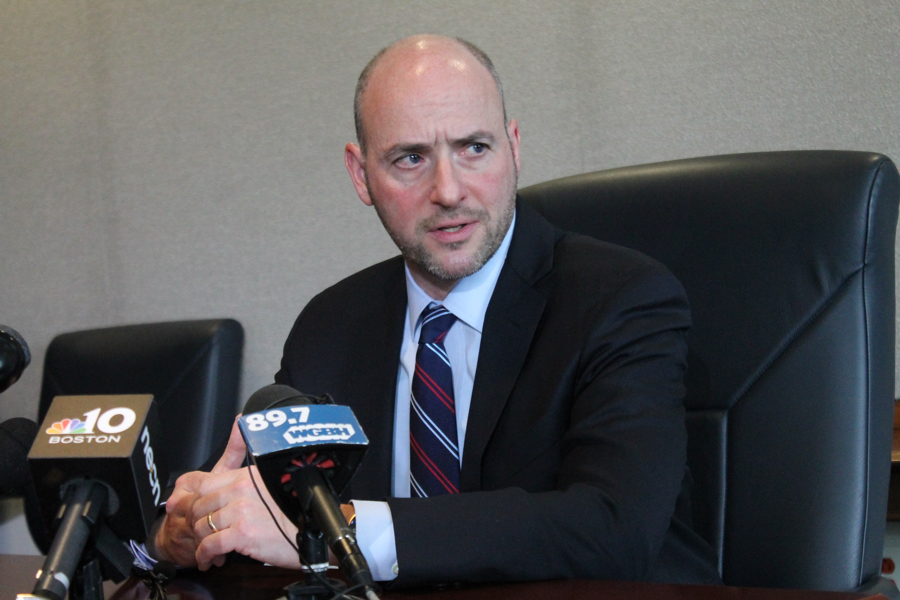U.S. Attorney Lelling Finally Says He Will Get Out of Legal Marijuana’s Way
He issued his most reasonable statements yet on the new industry.

Photo via Sam Doran/SHNS
After inducing months of headaches for Massachusetts’ budding marijuana industry, U.S. Attorney Andrew Lelling has signaled he will get out of the way, saying in a statement that although the drug remains illegal at the federal level his office would avoid prosecuting state-legal pot companies in most cases.
“Because I have a constitutional obligation to enforce the laws passed by Congress, I will not effectively immunize the residents of the Commonwealth from federal marijuana enforcement,” he wrote. “My office’s resources, however, are primarily focused on combatting the opioid epidemic that claims thousands of lives in the Commonwealth each year.”
In what amounts to his most clear-eyed response yet to the conflict between state and federal law, Lelling identified a few areas of marijuana enforcement that his office would prioritize, including “overproduction” at grow facilities that might lead to the drug being diverted to organized crime or across state lines, and the the targeted sales of the drug to minors (state law prohibits pot shops from selling to anyone under 21). Lelling also said that his office would prosecute legal marijuana businesses if their proceeds support gangs.
Overproduction: Despite regulatory efforts to address this problem, licensed outdoor marijuana cultivation still creates a significant risk of overproduction, which in turn creates the risk of illegal, and lucrative, marijuana sales to users in nearby states where recreational marijuana use remains illegal. These out-of-state sales are nearly always cash transactions and so often involve federal tax fraud designed to hide the illicit cash or its true source.
Targeted Sales to Minors: Advocates for state-level legalization fail to emphasize the risks marijuana use poses for minors. And, despite state-mandated age requirements, marijuana use among minors will surely now increase. Study after study confirms that regular marijuana use is dangerous to adolescent brain development, a process that appears to continue into a person’s early 20s. The targeted sale of marijuana to minors may warrant federal prosecution.
Organized Crime and Interstate Transportation of Drug Proceeds: Drug proceeds often finance organized criminal activities. My office will continue to prosecute organized criminal groups, like MS-13, that distribute drugs in violation of federal law, regardless of whether that distribution is legal under state laws. To that end, federal investigators will continue to police the Commonwealth for incoming or outgoing shipments of cash as well as use of the federal banking system.
Lelling, a Trump appointee, caused hubbub this year after he took the role. Attorney General Jeff Sessions had announced he would roll back an Obama-era edict that advised U.S. attorneys not to prosecute marijuana businesses in states that had legalized the drug, and Lelling did little to calm nerves in Massachusetts by refusing to rule out a crackdown, although he has said all along he would consider marijuana prosecutions on a case-by-case basis. He emphasized this week that the list was “not exclusive” and that he reserves the right to enforce the federal law on pot if he sees fit to do so.
He has made clear he is no fan of the drug. In his statement, he asserted that “marijuana use among minors will sure now increase” and chastised pot activists for failing “to emphasize the risks marijuana use poses for minors.” He has said previously he believes the drug is “dangerous.”
Still, industry leaders tell the Boston Globe that they’re hopeful this is a sign that Lelling will leave them alone, although it’s not clear whether his sort-of blessing will inspire any local banks to start working with the pot industry. So far, none have come forward, in part because they worry about crossing the federal government. As a result, pot businesses have to deal entirely in cash.
There were some head-scratchers in his statement. Legalization activists blasted him for messing up the date it became legal to distribute the drug in the state, incorrectly writing that it began on July 1 (that was the date set as a benchmark for when recreational stores could open their doors; recreational marijuana has been legal since December of 2016). He also asserted that “marijuana use among minors will surely now increase,” although there is little evidence that’s true, and in fact the trend appears to be going the other way.


